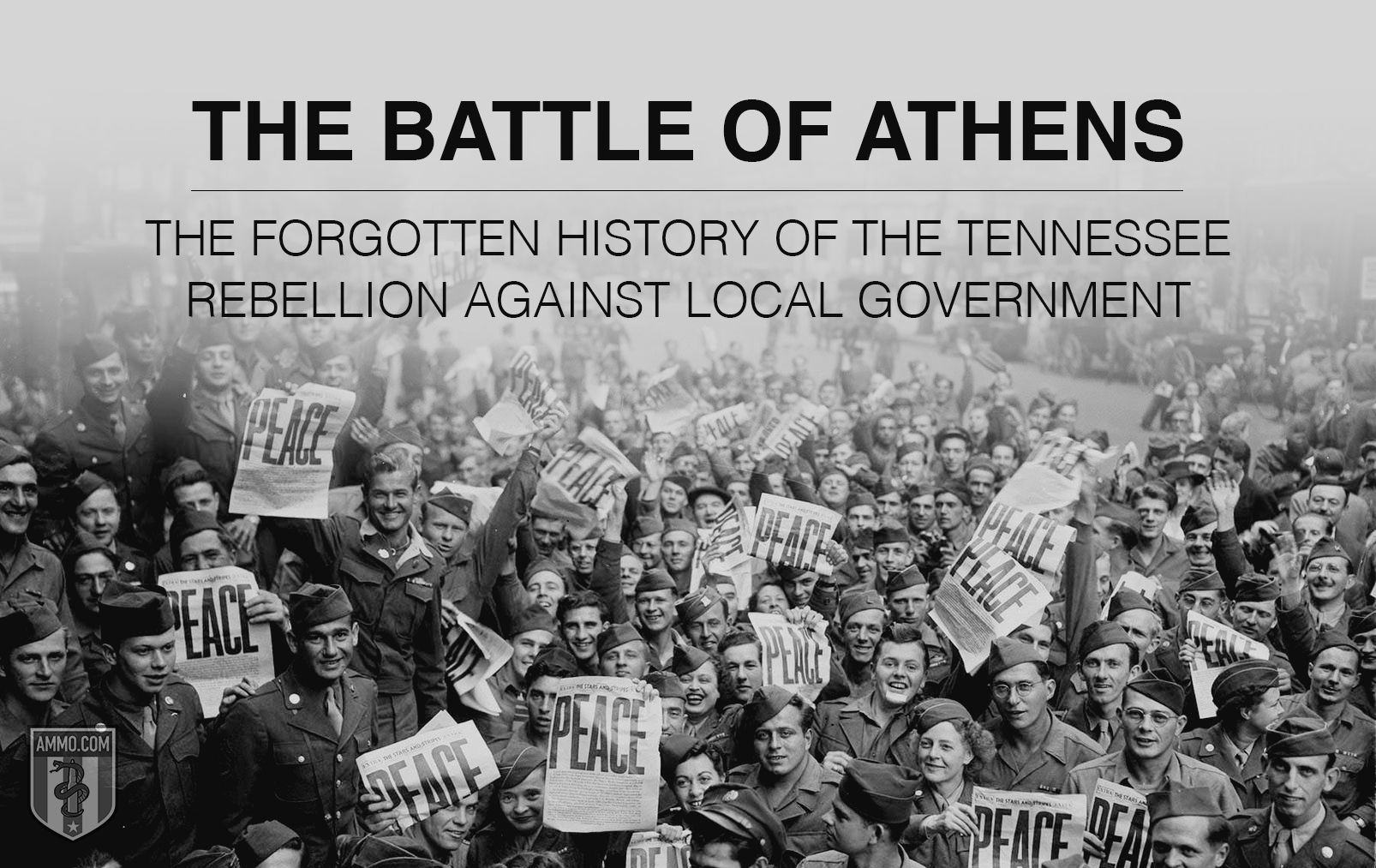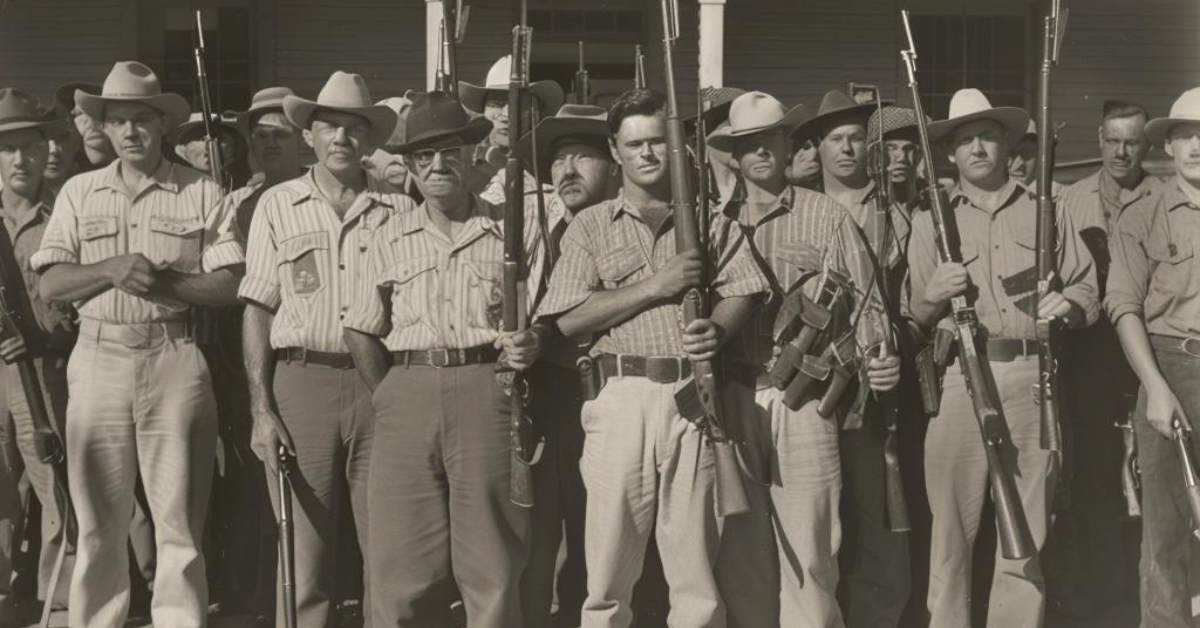
The Day Democracy Was Fired Upon: Remembering the Battle of Athens, Tennessee
In the annals of American history, certain events stand as stark reminders of the fragility of democracy and the eternal vigilance required to preserve it. Among these, largely forgotten by the mainstream, is the "Battle of Athens, Tennessee," a dramatic and violent uprising that occurred in August 1946. It was a moment when returning World War II veterans, having fought for freedom abroad, found themselves fighting for the very same principles on their home soil, taking up arms against a deeply entrenched and corrupt political machine that had systematically undermined their fundamental right to vote.
The year is 1946. The world had just emerged from the shadow of total war, and millions of American servicemen were returning home, eager to rebuild their lives and enjoy the freedoms they had so valiantly defended. They carried with them not just the scars of battle, but a profound understanding of what they had fought for: self-determination, justice, and the democratic process. But for many of these veterans in McMinn County, Tennessee, the reality awaiting them was a stark contrast to the ideals they had championed.
McMinn County, a largely rural area nestled in the Appalachian foothills, had for decades been under the iron grip of a political machine controlled by state senator Paul Cantrell and his ally, Sheriff Pat Mansfield. This machine, colloquially known as "The New Deal Gang" or "The Cantrell Machine," had perfected the art of electoral fraud and intimidation. Elections were a farce, manipulated through a combination of poll taxes, vote buying, "ghost voting" (casting ballots in the names of deceased or non-existent residents), and outright ballot box stuffing. To ensure compliance, Sheriff Mansfield’s deputies, many of whom were ex-convicts or roughnecks, were notorious for their brutality, often beating and harassing citizens who dared to question the status quo. These deputies, armed and operating with impunity, were the enforcers of the machine’s will, particularly on election days.

The veterans returning to McMinn County, many of them beneficiaries of the GI Bill, found this state of affairs intolerable. They had risked their lives to fight totalitarian regimes overseas; they were not about to tolerate a homegrown dictatorship. "We had fought for four years for the right to vote for people who believe in democracy," one veteran reportedly stated, encapsulating the sentiment shared by many. They had seen the horrors of fascism and believed in the power of the ballot box. Their experiences abroad had instilled in them a sense of civic duty and a fierce belief in democratic principles that they were unwilling to compromise.
A group of these veterans, led by figures like Bill White, Ralph Duggan, and most notably, Knox Henry, decided they had had enough. They formed the GI Non-Partisan League, a coalition dedicated to cleaning up local government and ensuring fair elections. Their platform was simple: honest government, an end to poll taxes, and respect for the law. They nominated a slate of their own candidates, including Knox Henry for sheriff, running against the incumbent Pat Mansfield. Their campaign was an uphill battle against a deeply entrenched power structure that held all the levers of local authority.
As the election day, August 1, 1946, dawned, tensions were palpable. The veterans knew what to expect. They had been warned, threatened, and some had even been physically assaulted during the campaign. They prepared themselves, but perhaps not for the brazenness of the fraud that would unfold.
From the moment polls opened, Mansfield’s deputies began their usual tactics. They stood armed at polling places, intimidating voters, turning away legitimate voters, and allowing known "machine" voters to cast multiple ballots. Veterans serving as poll watchers, appointed to observe the process, were routinely harassed, beaten, and arrested on trumped-up charges. One particularly egregious incident involved a disabled veteran poll watcher named Paul Pruitt, who was struck by a deputy when he protested a fraudulent vote. When another veteran, Tom Gillespie, intervened, he was shot and wounded by a deputy.
By late afternoon, it became clear that the machine was, once again, stealing the election. The most crucial moment arrived when the deputies, under the direction of Sheriff Mansfield and Cantrell, seized the ballot boxes from the polling places. This was a common tactic, allowing them to "adjust" the vote counts in their favor away from public scrutiny. They transported the ballot boxes to the McMinn County Jail, a sturdy brick building that served as the machine’s fortress, where they intended to "count" the votes in secret.
This act of brazen theft was the final straw. Word of the seized ballot boxes and the violence against the poll watchers spread rapidly through Athens. The veterans, who had gathered at their campaign headquarters, were furious. They knew that if the ballot boxes were not recovered, their efforts – and indeed, the very concept of a fair election – would be lost.
A crowd began to gather, not just veterans, but ordinary citizens, parents, and friends, all united in their outrage. The veterans made a decision: they would not let this stand. They began to arm themselves. Some went home for their personal firearms – hunting rifles, shotguns, pistols. Others converged on the National Guard Armory in Athens, where a small cache of weapons, including a .45 caliber machine gun, was stored. Under the leadership of Knox Henry, who was technically still a candidate for sheriff, they broke in and appropriated the weapons.
By early evening, a force of several hundred armed veterans and citizens surrounded the McMinn County Jail. Inside, Sheriff Mansfield, Cantrell, and their deputies, numbering around 50, were holed up with the stolen ballot boxes. The veterans demanded the release of the poll watchers and, more importantly, the ballot boxes. When their demands were met with silence, and then with gunfire from inside the jail, the siege began.

The ensuing hours were a chaotic and terrifying exchange of fire. The deputies, positioned in the jail, had the advantage of cover. The veterans, however, were skilled marksmen, many of them fresh from combat. They cut the phone lines to the jail, plunging the building into isolation. They disabled the deputies’ vehicles parked outside, using dynamite sticks to blow out tires and engines, preventing any escape or reinforcement. The air was thick with the smell of gunpowder and the sound of bullets ripping through the night.
"We were determined to see that election counted fairly," recalled one veteran, Harry Harrison, years later. "We didn’t know what was going to happen, but we knew we had to do it."
As the night wore on, the veterans intensified their assault. They used the machine gun to suppress fire from the jail windows. They lobbed dynamite, not to kill, but to create confusion and to disable the jail’s lighting system, plunging the building into darkness. The deputies, outmaneuvered and outgunned, began to panic. Around 3:30 AM, after hours of intense standoff, the deputies inside the jail, realizing their position was untenable, surrendered.
The veterans burst into the jail. They found the deputies cowering, some injured. Remarkably, despite the heavy exchange of gunfire, no one was killed in the battle itself, though several were wounded on both sides. The ballot boxes were secured, and the poll watchers were released.
The next morning, under the watchful eyes of the veterans and an amazed public, the votes were counted. The results were clear: the GI candidates had won by a landslide. Knox Henry was elected sheriff, and the entire GI slate swept the county offices. The Cantrell Machine was utterly dismantled overnight. Paul Cantrell and Pat Mansfield fled the county, their political careers in ruins.
The Battle of Athens, Tennessee, sent shockwaves through the state and briefly captured national attention. Headlines like the one in the Memphis Commercial Appeal declared, "GI’s Win in McMinn Election, County Officers Ousted After Fierce Battle." While some condemned the veterans’ actions as vigilantism, many others saw it as a heroic stand for democracy, a necessary evil to restore the rule of law.
In the immediate aftermath, the new GI government faced the daunting task of cleaning up decades of corruption. They established fair elections, reduced taxes, and implemented more transparent governance. While some of the initial enthusiasm eventually waned, and the GI slate eventually lost power in subsequent elections, the fundamental lesson of Athens endured: the power of the people, when pushed to the brink, can overcome even the most entrenched corruption.
The Battle of Athens remains a potent, if largely overlooked, chapter in American history. It serves as a stark reminder that democracy is not a given; it is a system that must be actively defended and nurtured. It highlights the profound responsibility of citizens to participate in their government and to hold their leaders accountable. For the veterans of McMinn County, their fight was not just about local politics; it was about upholding the very ideals they had pledged their lives to protect. Their actions, though controversial, stand as a testament to the enduring spirit of self-governance and the unwavering belief that the ballot box, not brute force, should be the ultimate arbiter of power in a free society. It was the day democracy, quite literally, fought back.


